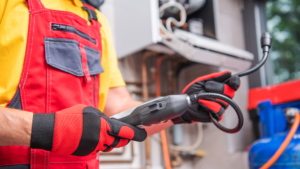 Natural gas is one of the cleanest ways to power your home. It heats your water. It warms your stove. And it dries your clothes. Unlike carbon monoxide, however, there’s no device capable of detecting it. Instead, gas leaks have to be identified by sight, smell, and sound. That’s why it’s vital for every homeowner to know how to answer the question: “What does a gas leak smell like?”
Natural gas is one of the cleanest ways to power your home. It heats your water. It warms your stove. And it dries your clothes. Unlike carbon monoxide, however, there’s no device capable of detecting it. Instead, gas leaks have to be identified by sight, smell, and sound. That’s why it’s vital for every homeowner to know how to answer the question: “What does a gas leak smell like?”
Because gas is odorless, utility companies mix it with a compound called mercaptan. Mercaptan is harmless but has a distinctive smell. It reminds most people of rotten eggs or sulfur. To others, it reminds them of cabbage, onions, chives, or sewage.
Other Signs of a Gas Leak
An unpleasant, unexplained smell is the most common indicator of a gas leak, but there are others to watch out for as well. Natural gas is toxic and flammable, so be alert.
- Hissing. Gas sometimes creates a sustained hiss as it escapes from your pipes. Most gas lines attach to the back of your appliances, such as the stove, water heater, and dryer. If you hear a hiss, whistle, or fizzle coming from one of them, you could have a serious problem.
- Bubbles in Water. Natural gas is often used to heat pools and hot tubs. If you see bubbles rising from under the water, one of your gas lines may have sprung a leak. You can also use bubbles to confirm leaks in above-ground piping. Rub a small amount of soapy water over the gas line. If bubbles appear, you have a leak.
- White Mist or Fog. When natural gas mixes with water vapor in a cold environment, it condenses and forms a cloud. If you see one forming in your home, lawn, pool, or garden, take action immediately.
- Dead Plants. A patch of dead grass on your lawn could mean you have an underground gas leak, especially if it doesn’t respond to water or fertilizer.
- Unexplained Sickness. Inhaling natural gas causes serious health problems. However, unlike an ordinary illness, a gas leak causes everyone in the house to get sick simultaneously. The most common symptoms are:
- Dizziness
- Fatigue
- Headache
- Nausea
- Shortness of Breath
- Pale Skin
- Irritated Eyes and Throat
What to Do If You Detect a Gas Leak
Gas leaks are dangerous. People not only die from inhalation but also from fires and explosions caused by leaks that were either undetected or handled improperly. If you’ve identified a leak in your home, or suspect you might have one:
- Don’t Touch Any Electrical Switches. Turning anything on or off might trigger a spark.
- Don’t Try to Fix the Problem Yourself. If you don’t know where the leak is, you’ll put yourself at risk trying to find it. Conversely, if you know where it is, working on it could cause a spark and ignite the gas. Let a professional handle it instead.
- Open Your Doors and Windows. You don’t want gas to build up inside your home, so open as many doors and windows as you can to help dissipate it.
- Evacuate. Get out of your house. If the leak is outside, leave the property.
- Call Your Gas Company or Fire Department. They’ll have the tools and experience to find and repair the leak safely.
Protecting Your Home with Agway Energy Services
Natural gas is an essential part of most central heating systems. When your gas lines break down, you call the gas company and let them pay for it. But when your gas furnace breaks down, you’re stuck paying for it on your own. Not Agway customers, however.
As soon as they sign up, they’re enrolled in our EnergyGuardTM repair program. That means when their essential systems break down, we dispatch a local technician and pay for repairs on all covered parts. There are no deductibles or service fees. Just solid protection 24/7/365. Sign up today!